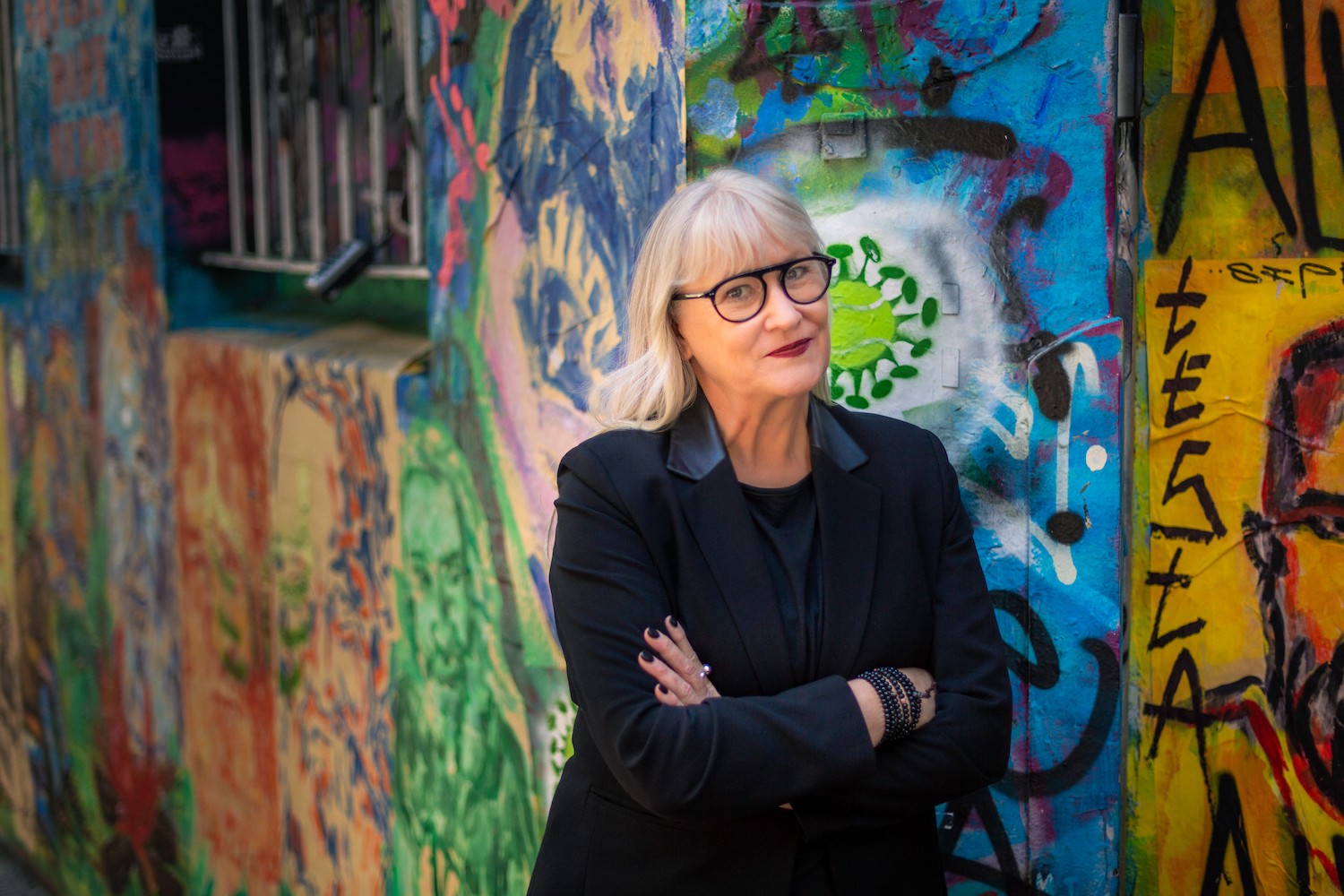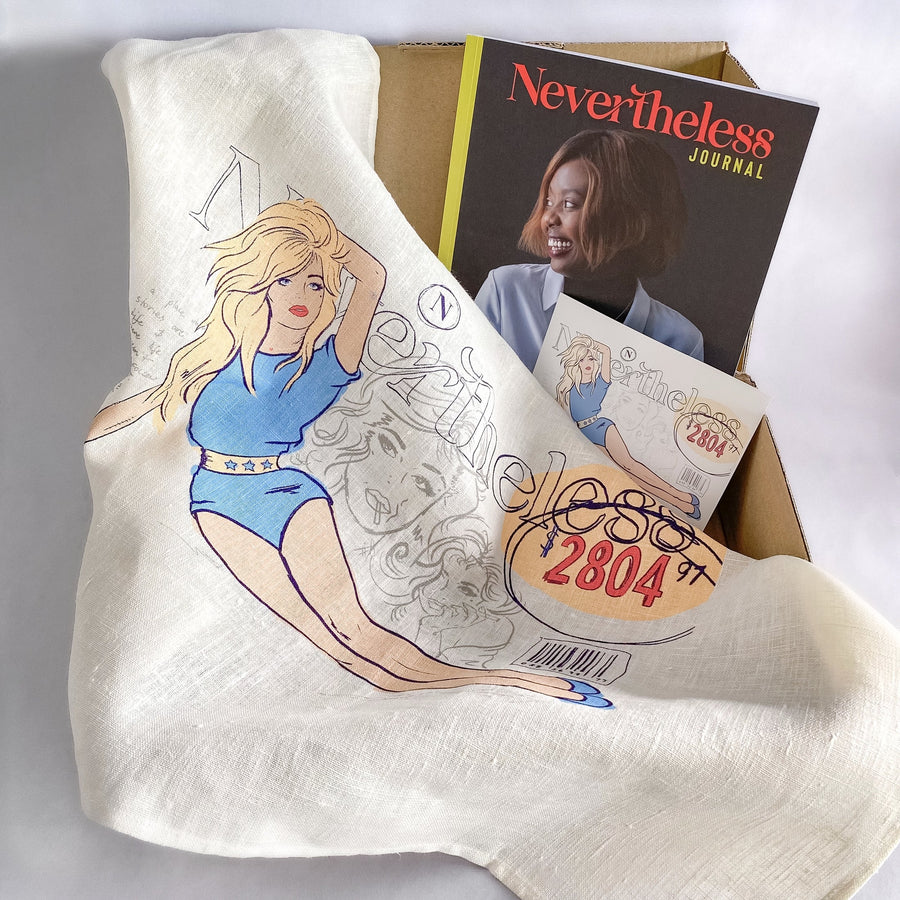Janine Hendry: The tweet that spawned a movement

Words by Natalie O'Driscoll
On 25 February 2021, Melbourne activist Janine Hendry sent out a tweet asking people to form a ring around Parliament House in Canberra, in order to protest the Morrison government.
She was angry at their handling of the Brittany Higgins allegations and then further angered by the sex abuse allegations that then-Attorney General Christian Porter denied, and the whole Barnaby Joyce fiasco. She was angry at the gut-wrenching stories of horrific sexual violence in schools.
And that anger was reflected in the community. 110,000 women and their allies marched around the country under the banner of March4Justice, and their voices were heard around the world.
Still an advocate, speaker and social justice entrepreneur, the unstoppable Janine doesn’t mince words when it comes to gender inequality.
“I think about how much harder it is for women to do and achieve anything,” she says. “We work harder -- and we know this empirically -- we work longer hours, we do more childcare and we do more fucking housework.
“We never focus either on the stuff we can’t measure. The organising birthday parties, the Christmas shopping, the social engagement and connection. That load -- we can call it emotional labour if that’s the word that people relate to -- it goes on and on and it hasn’t changed.”

A feminist her entire life, Janine lost her mother when she was just six years of age. She was raised in an all-male household once her older sister left home.
“The woman who was of significance influence to me was Margaret Hendry,” says Janine.
“She was my father’s youngest sister, my aunt and she in fact received an Order of Australia for her work for the women of Australia. She was largely responsible for getting the equal pay for women legislation through in the late 70s and 80s.
“So I grew up in this environment where I had a father who was quite empowering, who brought me up under the notion that I could do anything and I could be anything as long as first and foremost I was myself, so I had that really strong belief the whole world was open, and I always remember him saying to me: ‘If you wanna be a truck driver that’s great, just be the best truck driver you can.’
“I lived in this environment with this male influence where I believed that men cooked and cleaned and washed because that’s what my father did.
“Then I had this incredibly strong career woman who I would spend holidays with; an extraordinary woman. So perhaps I had this really skewed view of men and women’s roles but also kind of what equality looked like.” She sighs.
“It was a shock to me when I finished university and got my first job and there were three of us employed as lecturers, and one of the other guys started at the same time.
“We had known one another for a while and we were having a chat about salary; in uni they have bands of salary like public service. And he asked ‘what band did you get?’ and I said ‘halfway up’ and I said ‘what band are you?’ And he said ‘oh no I’m at the top.’
“He was a couple of years older than me but I was more experienced and had better qualifications.

“So I marched into the head and he said ‘oh he’s just got more experience than you’, which was absolutely not true. But I knew at that point in time, that the experience I’d had growing up was really different than what I was going to experience.
“It was a really pivotal moment in time here. I thought ‘wow all of that work that Margaret did actually means nothing’. It’s still really significant. But it means that they found other ways to get around it. We can have the structural reform in place but they’ll still get you where they can, the patriarchy and the men who control the system.”
Janine wants people to realise that equality is the foundation of everything.
“When we talk about the rates of gendered violence in this country, we have to know it is because women are fundamentally not equal. Not equal financially, emotionally, socially, and when there’s such an imbalance that’s when we start to see it being played out with this violence and physical and emotional abuse that women deal with.
“And First Nations women are twelve times more likely to experience abuse. I can’t reconcile it against the fact that Australia has one of the highest incomes in the world. We are one of the wealthiest countries in the world. And yet our levels of inequality and the subsequent impact of that playing out is just mind boggling."
"It’s like what right do we even have to call ourselves a civilised society when we treat our women this way?”
Janine talks about the afternoon she sent out her viral tweet.
“In the months prior to the March4Justice I had been, as everyone had, listening to the media reports about what was going on in our parliament. Prior to that we’d had a then-Deputy Prime Minister Barnaby Joyce having an inappropriate relationship with a much younger staffer, then denying paternity of the child that came from that relationship.
“And then we’re talking about Brittany Higgins and how the government responded to the sexual assault allegations. And we’ve got Chanel Contos, the woman who did all this work on the first sexual experience of the young private school kids in Sydney, how these young boys are all assuming rights over women’s bodies. The schools that our highest lawmakers in the land come from.
“My then 15-year-old son is upstairs and in my mind I’m thinking I’ve done everything to raise him as a feminist. To understand the importance of equality.
“If we’re going to see change in the world it has to come from the people in power, like my son Charlie will be. And yet who does he have in the highest positions as role models? Porter, Morrison, Joyce, these men. Tudge. They’re all there. They have the most power in this country and this is how they’re treating women.
“And I snapped. I just snapped. I knew that as a mother I had to know that I have done everything to demonstrate to this young man that this behaviour is not ok. And I thought ‘you know what? I’m going to dig out my Doc Martens and I’m going to get in the car and drive to Parliament House and I’m going to make a placard.
“I wonder if there’s enough women out who would do this, circle Parliament House and turn our backs on it in silent protest.
“I didn’t care if it’s me and six mates. I didn’t care if it was just me. I’ll stand there with a placard if I have to, because I have to lead by example and let me son know that what’s going on is not okay. Two weeks later, more than 100,000 women and their allies let the government know that it wasn’t okay.”
Janine believes that all she did was harness energy that had been building for a while.
“I think collectively we had had enough. We had enough. The gender pay gap in Australia is getting worse, not better. Australia has now slipped from 13th to 50th place on the global gender equality index [the 2022 results came out after this interview. Australia is now in position 43.]
“Girls in Cambodia, Zimbabwe, Montenegro have a greater chance of achieving equality than a girl born in Australia. How do we feel about that?
“It’s interesting because people think I have a daughter and I did it for my daughter, but I did it for my son, because they’re the key. The only way we’re going to get to a point of equality is if we get those that hold the power to take responsibility.”
So what is Janine’s vision for a pathway to a more equal world?
“There are two things that have to happen if we’re going to progress with equality. We need systemic and structural reforms. We need equal numbers of women on boards, in Parliament, in universities, in any seat where decisions are being made.
“And where the power is being held, we need diversity. Not just women, we need representation from our First Nations community, from people who are living with a disability, and other communities.”
Janine has done her part bringing March4Justice together, and while she remains a founding member of the organisation, she is happy to hand over the reins to the rest of the team, and the country.
“It’s now up to the women of Australia to do with it what they will.”


